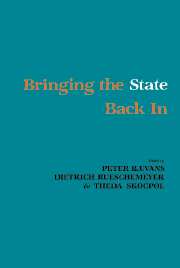Part II - States and Transnational Relations
Published online by Cambridge University Press: 29 January 2010
Summary
Individual states as actors and institutions have always been embedded in political and economic relations that move beyond the territories and people they directly govern. Indeed, in the “modern world system,” which emerged out of the fragmented sovereignties of European feudalism in the context of commercial relations linking Northeastern Europe to Eastern Europe and Latin America, transnational economic flows and international geopolitical competition have been especially intense. Such relations have directly constituted the boundaries and identities of the modern national states that now monopolize coercive sovereignty across the globe. Looking at the behavior of states in relation to political and economic activities that cross their borders is therefore an essential part of any attempt to understand the modern state. The three essays in this section demonstrate diverse and mutually complementary ways in which this analytical task may be pursued.
At first glance, the heterogeneity of the essays in this part is striking, for they focus on quite different problems, times, and places. Charles Tilly's “War Making and State Making” juxtaposes examples from fourteenth- to seventeenth-century European history with provocative economic models of states as predators. Peter Katzenstein's contribution offers a carefully crafted comparison of domestic political arrangements as they relate to international economic openness for Switzerland and Austria, two of the least predatory nations of post–World War II Europe. And Peter Evans offers a general argument in “Transnational Linkages and the Economic Role of the State” that focuses principally on the domestic economic policies of contemporary Third World countries.
- Type
- Chapter
- Information
- Bringing the State Back In , pp. 165 - 168Publisher: Cambridge University PressPrint publication year: 1985
- 1
- Cited by



